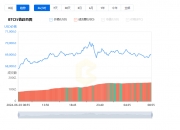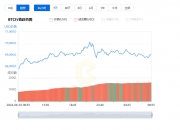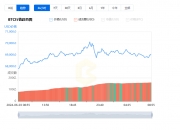
一、概述
近年来,中央及各地方政府相继出台了多项纲领性文件,以加速推动我国区块链技术发展落地。据不完全统计,2020 年以来,国家及地方层面共发布了 179 条区块链相关政策,政策内容包括产业培育、落地应用、行业监管等多方面。政策红利之下,区块链产业正在加速爆发,区块链企业数量逐年上升。根据赛迪智库发布的《2020年上半年中国区块链企业发展报告》,我国区块链技术相关企业注册数量持续增加,总数已超过 4 万家,仅2020年上半年,新成立的企业高达8146家,增长率达到275.31%。
In recent years, the central and local governments have produced various programmatic documents to accelerate the technological development of the country’s block chain. According to incomplete statistics, since 2020, 179 block-chain-related policies have been issued at the national and local levels, including industrial development, land-fall applications, industry regulation, etc. Under the policy dividend, the sector-chain industry is accelerating and the number of block-chain enterprises is rising year by year. According to the Report on the Development of Businesses in China’s Block Chains in the first half of 2020, the number of technology-related enterprises in the block chain has increased steadily, to a total of more than 40,000, and in the first half of 2020 alone, the number of new enterprises has risen to 8146, with a growth rate of 275.31 per cent.
各行各业对不同种类的区块链人才有了更大的需求。根据拉勾大数据研究院发布的《2020年新基建人才报告》,六大新基建直接相关行业的人才需求指数大幅上升,其中区块链行业人才需求增幅达67%,为新基建相关行业最高。
According to the New Capital Talent Report 2020, published by the Research Institute for the Promotion of Big Data, there has been a significant increase in the numbers of people in the six new infrastructure-related industries, with the number of people in the sector growing by 67%, the highest in the new infrastructure-related industries.
但是,作为一个新兴发展的行业,人才紧缺正在成为制约区块链企业进一步发展的重要因素,在区块链招聘市场中,人才处于“一将难求”的地步。《光明日报》报道援引从业者观点指出,区块链行业仍处在相对早期的起步阶段,目前在国内外的大学里几乎都没有单独设置针对区块链行业的学科,用人单位虽然开出了丰厚的待遇,但符合要求的求职者可谓凤毛麟角。
However, as a newly developed industry, the shortage of talent is becoming an important constraint on the further development of block chains, where talent is “one-size-fits-all” in the recruitment market. The Daily Light reports cite the view of practitioners that the sector is still at a relatively early start, that there are currently few separate disciplines in universities, both at home and abroad, and that, despite the generous treatment offered by employers, the job-seekers who meet the requirements can be considered the best job-seekers.
由工信区块链产业人才研究所指导发布的《2020区块链产业应用与人才培养报告》中具体指出了中国区块链行业人才培养面临的难题:
The report on the application and talent development of the block chain industry in 2020, issued under the direction of the Institute of Industrial Talents in the Trade-in-Technology Chains, identifies the challenges faced by the Chinese block-chain industry in terms of talent development:
1.在人才培养时间方面,因为区块链行业还是一个新兴事物,行业人才的培养时长和入行难度均比互联网行业要高。
1. With regard to the timing of human development, since the block chain industry is still a new business, it is more difficult to train and enter the Internet than it is to do so.
2.在政策方面,缺乏人才培养政策。上海、香港、杭州、重庆、贵阳等地纷纷出台数字经济区块链产业“抢人”政策,但相关明确的人才培养政策还未完善。
At the policy level, there is a lack of policies to train people. In Shanghai, Hong Kong, Hangzhou, Chongqing, and Guiyang, there are a number of policies to “keep people away” from the digital economy.
3.存量人才质量方面,拥有相应知识结构和工作经验的存量人才凤毛麟角。
3. In terms of the quality of the stock, there is a critical mass of people with the corresponding knowledge structure and work experience.
4.在人才标准方面,工信部人才交流中心已发布首个区块链岗位能力标准,但整个行业的人才培养标准还有待丰富和完善。
4. In terms of talent standards, the STC has issued the first job-chain competency standards, but the training standards for the entire industry have yet to be enriched and refined.
概括来说,由于区块链人才培养周期长,高校培养体系不完善,且区块链涉及IT、通信、密码学、经济学、组织行为学等诸多知识领域,需要具备一套高度复合性的知识体系,因此“区块链+产业”的复合型人才严重匮乏,持续面临供不应求的局面。
In summary, because of the long cycle of block-chain talent development, the imperfect system of higher education, and the many areas of knowledge such as IT, communication, cryptology, economics and organizational behavioral science, which require a highly complex knowledge system, the complex talent of the “block-chain plus industry” is severely lacking and continues to be under-supplied.
针对这一区块链人才市场的巨大痛点,贵阳大数据交易所特推出“区块链工程师(高、中、低级)”人才认证教育考试培训项目,旨在解决区块链人才巨大缺口的同时,提高参训人员区块链工程技术能力,完善区块链再教育培训体系。
In response to the enormous pains of this block chain talent market, the Guiyang Data Exchange has launched a project for the training of block chain engineers (high, medium and low level) in the certification of education examinations, aimed at addressing the huge gap in the block chain, increasing the technical capacity for block chain engineering for participants and improving the block chain re-education training system.
二、应用行业及场景
II. Application industries and scenes
物流溯源
Logistics Retrieval
产品生产流转的全流程信息由各参与方(生产商、物流仓储服务商、检验检测机构、经销商等)在链上进行登记记录,并分布保存于区块链各个节点中,利用区块链技术的不可篡改性,保证信息的完整性和产品生产流转过程的可追溯性。消费者通过手机APP识别产品的唯一标识,并通过该标识从区块链溯源平台即时获取产品生产流转的各环节信息。
The full-flow information on product production flows is recorded on the chain by the various participants (producers, logistics warehouse providers, inspection and inspection agencies, distributors, etc.) and is distributed among the nodes of the block chain, using the inexorable nature of block chain technology to ensure the integrity of the information and the traceability of the product production flow. Consumers identify the only identifier of the product through mobile phone APP, and obtain instantaneous information on the product flow from the block chain traceability platform.
核心交易场景搭建
将区块链与原生系统对接,平台中产生数字商品交易后,利用区块链不可篡改特性将数据上链存证。原生系统从区块链中获取交易信息,将交易的数字商品与卖家解绑,与买家绑定,实现数字商品自动化交易切割。出现纠纷时,平台可提供区块链中存储的交易证据。
If a dispute arises, the platform can provide evidence of the transaction stored in the chain of blocks.
版权保护借助区块链技术,打造区块链版权交易商城
帮助版权著作者和版权使用方建立一个真实有效的知识产权交易管理平台。区块链存证:联合多家公信机构,将版权信息形成唯一有效的资产编码,链上确认权益。引入智能合约:将传统线下版权登记等方式通过技术线上实现,避免繁琐的文书工作。支持在平台内流通,方便使用者购买。依赖于个人承诺、机构也可通过线上自动执行版权交易。去中心化管理:交易数据采用区块链分布式账本记账,保证交易不可篡改。使用技术手段保证版权流转有效性,保障交易各方权益。
To assist copyright writers and copyright users in establishing a real and efficient platform for managing intellectual property transactions. Block chaining: a joint multi-public institution, which establishes copyright information as the only valid asset code and recognizes rights and interests on the chain. Introduction of smart contracts: registration of copyrights off the traditional line, etc., is done on the technical line and avoids cumbersome paperwork. Support for circulation within the platform to make it easier for users to purchase.
电子商务、票据
链上唯一标志码:搭建基于区块链的开票平台,为每张电子发票生产一个唯一标示的密钥,发票一经使用,开票数据直接上链,保证一票一码。引入监管保障真实性:财政电子票据系统作为数据认证节点,保证票据真实性,并提供验证服务平台内各方信息实时共享:基于区块链多中心化存储数据共享,平台内各参与方共同维护开票数据,发票状态一经改变便及时记录、实时共享。利用区块链不可篡改性,数据更加透明,让合作者之间更能信任采用二级分销模式:让后进入者和先进入者之间没有成本差异,而更有意愿加入增加通证流通方案:通证可以在商城中进行商品购买,且支持第三方电商商品购买,使得通证真正可以被使用,保证通证流通的价值权益。
The only marking code on the chain is: the building of a single marked key for each electronic invoice, which, once used, is directly linked to the billing data, guarantees a single ticket. The introduction of a regulatory guarantee of authenticity: the financial electronic paper system serves as a data authentication node, guarantees the authenticity of the instrument and provides real-time sharing of information among parties within the certification service platform: based on multi-centralized data-sharing of the block chain, the common maintenance of billing data by the various participants in the platform, the timely recording and real-time sharing of invoice status as soon as it is changed. The use of the block chain is inexorable, the data is more transparent and gives collaborators greater confidence in the use of the secondary distribution model: there is no cost difference between late entrants and first entrants, and there is a greater willingness to join a programme to increase the circulation of certificates: certificates can be purchased for goods in a commercial city and support third-party purchases of electrical goods, making them truly usable and guaranteeing the value interest of negotiable documents.
等级——人员要求(具备条件其一者可申报)——人员面向
Level - Personnel require () - Personnel face
初级
A.软件工程、计算机原理、物联网工程、通讯工程、电子信息技术、数据综合治理、数据管理、商务数据分析与应用等相关专业在校生,经本培训达到规定要求且考核合格者; A. Students in relevant fields such as software engineering, computer principles, object networking engineering, communications engineering, electronic information technology, data integration management, data management, business data analysis and applications, who have been trained to meet the required requirements and qualified; B.中、高职相关或其他专业毕业生, 经本培训达到规定要求且考核合格者; B. Graduates of secondary or higher-level related or other specialties who have met the required requirements and qualified for this training; C.具备区块链行业从业经验1—2年,经考核合格者。 C. A qualified person who has 1 to 2 years of experience in the block chain industry. A.中职在校生; A. Secondary school students; B.中、高职毕业生; B. Middle- and senior-level graduates; C.区块链从业人员。 C. Block chain practitioners. 中级 Intermediate A.高职或高职以上软件工程、计算机原理、物联网工程、通讯工程、电子信息技术、数据综合治理、数据管理、商务数据分析与应用等相关专业在校生,经本培训达到规定要求且考核合格者; A. Students in relevant fields such as high-level or higher-level software engineering, computer principles, object-networking engineering, communications engineering, electronic information technology, data integration management, data management, business data analysis and applications, who have been trained and certified as having met the required requirements; B.高职或高职以上相关专业或其他专业毕业生,经本培训达到规定要求且考核合格者; B. Graduates of relevant professions or other professions of higher or higher rank who have met the required requirements and qualified for this training; C.已取得本初级证书1—2年,经考科合格者; C. A person who has completed one to two years of this Junior Certificate and who has completed a qualification; D.具备区块链行业从业经验1—5年,经考核合格者。 D. Persons who have had experience in the block chain industry for one to five years and who have been certified as qualified. A.高职或高职以上在校生; A. Students at higher or higher levels of schooling; B.高职或高职以上毕业生; B. Graduates from senior or higher positions; C.区块链或大数据衍生行业相关从业人员。 C. Practitioners associated with the block chain or big data derivatives industry. 高级 A.本科(及以上)软件工程、计算机原理、物联网工程、通讯工程、电子信息技术、数据综合治理、数据管理、商务数据分析与应用等相关专业在校生,经本培训达到规定要求且考核合格者; A. Students in relevant specialties such as software engineering, computer principles, object networking engineering, communications engineering, electronic information technology, integrated data management, data management, business data analysis and applications, who have been trained and certified as required; B.本科及以上学历相关专业或其他专业毕业生,经本培训达到规定要求且考核合格者; B. Graduates of undergraduate or higher-related or other specializations who have met the required requirements and qualified for this training; C.已取得本中级证书1—2年,经考科合格者; C. Persons who have obtained this intermediate certificate for one to two years and who have been certified; D.具备区块链行业从业经验5—10年,经考核合格者。 D. Has 5-10 years of experience in the block chain industry and has been certified as a qualified person. A.本科在校生; A. Undergraduate students; B.本科及以上学历毕业生; B. Graduates from undergraduate studies and above; C.从业人员; C. Practitioners; D.院校教师(双师型) D. Schoolteachers (dual teachers) 三、项目特点 认证项目以区块链国家标准意见征求稿为依据,《信息技术区块链和分布式记账技术 参考架构》(计划号:20173824-T-469)、《信息技术 区块链和分布式记账技术 存证应用指南》(计划号:20201612-T-469)、《信息技术 区块链和分布式记账技术 智能合约实施规范》(计划号:20201615-T-469)作为职业技能等级考试培训项目中培训方案、考试大纲、培训教材和学习资源的开发依据,填补我国普通教育、职业教育在区块链工程技术职业领域空白,推广执行本标准,将极大推进区块链工程技术人才培养和认证工作,具有先进性、科学性和发展性。培训内容紧贴区块链行业需求,以职业素质、岗位能力为导向,围绕各职业能力等级核心知识点,强调“任务驱动型”实战教学,采取“线上学习+线下授课”双结合的方式,理论结合实战,课程中配备丰富的实际应用案例和实训平台,培训师来自业务一线,具有企业人力资源部门认定的企业内训师资格,具备业务实操和授课教学的“双经验”。 The certification project is based on the National Standard Request for Advice on Block Chains, the Reference Framework for Information Technology Block Chains and Distributed Accountancy Technologies (Plan No. 20173824-T-469), the Information Technology Block Chains and Distributed Accountancy Technology Application Guide (Plan No. 20201612-T-469), the Information Technology Block Chains and Distributive Recording Technology Implementation Standard for Smart Contracts (Plan No. 20201615-T-469) as the basis for the development of training programmes, examination syllabuses, training materials and learning resources in vocational skill-level examinations, filling gaps in our technical areas of general education, vocational education in block engineering, promoting the implementation of this standard by combining the development and certification of technical personnel in the block chain of significant advancements, with advanced, scientific and developmental aspects. 院校培训中,开展师资培训和校企合作协同育人两种形式,对赋能教师和教授学生两手硬,客观上起到促进院校相关专业建设的作用。认证内容分作三个板块。第一,从业人员职业素质;第二,区块链工程技术应用;第三,区块链工程技术产品价值挖掘。从业人员职业素质从职业道德、服务意识、职业守则三个方面展开;区块链工程技术从分布式编程、数列结构构架、网络节点算法实现、结构控制、CPP密语、可视化、分析挖掘等方面展开;区块链工程技术产品价值挖掘从分析策略的角度对区块链产品项目做描述性分析、预测性分析、规范性分析等方法,分析工具,、商业价值挖掘,企业区块链垂直应用等方面展开。旨在培育受训者的职业操守、技术能力、业务能力,具备区块链产品思维模式,能够将政府、企业、机构的数据技术转化为有用的商业价值,不仅具备区块链工程技术、产品挖掘的能力,还能具备市场营销、商业模式、数据产品、企业管理、政府治理等方面的思维。 The content of the certification is divided into three sections. First, the professional qualifications of the practitioners; second, the technical applications of block engineering; third, the value of the technical products of block engineering. The professional qualities of the practitioners are developed in the areas of professional ethics, service awareness, professional codes and vertical application of the enterprise's block chains. The technology of block engineering is carried out in the form of distributed programming, numerical structure, network node algorithms, structural control, CPP language, visualization, analytical excavation, etc.; the value of the technical products of block engineering works is derived from analytical strategies, not only in terms of descriptive analysis, predictive analysis, normative analysis, analytical tools, commercial value extraction, and vertical application of the enterprise's block chain. The aim is to nurture the trainees'professional integrity, technical skills, operational capabilities, and models of product thinking in the sector, so as to translate government, enterprises, institutions and institutions'data technology into useful commercial values. 四、基本课程设置 IV. Basic curriculum 基础知识 Basic knowledge 4.1 区块链产业现状及趋势 4.1 Status and trends of the block chain industry (1)国内外区块链分析行业现状。 (1) An analysis of the current state of the industry in the internal and external sector. (2)区块链基础知识。 (2) Basic knowledge of the block chain. (3)公有链,联盟链与私有链。 (3) The public chain, the union chain and the private chain. 4.2 分布式编程-分布式中心化编程与一致性 4.2 Distributed programming-distributed central programming and consistency (1)分布式的一致性协同性共识。 (1) Distributed coherence and synergy consensus. (2)数列结构与线性表。 (2) Number column structure and linear table. (3)网络节点与共识算法实现。 (3) Network nodes and consensus algorithms are realized. 4.3 Solidity智能合约文件结构 4.3 Solidity Smart Contract File Structure (1)Solidity语言的数据类型。 (1) Type of data in the Solidity language. (2)表达式与控制结构。 (2) Expressions and control structures. (3)Truffle详解。 (3) Truffle elaborates. 4.4 详解区块链 4.4 Delineation of block chains (1)以区块链础与区块节点。 (1) Link the block to the block node. (2)以太坊源码admin.addPeer。 (ii) Using the Taiwan source code admin.addPeer. (3)以太坊智能合约编辑转换并执行。 (3) Edited and executed with Taiwan Smart Contract. (4)以太坊发布与EOS智能合约应用。 (iv) The application of the EOS smart contract is published in the Taiku. (5)对称和非对称加密 (5) Symmetric and asymmetric encryption 4.5 比特币与密码学讲解-哈希编程实战 4.5 Bitcoin and cryptography - Harshi programming for the actual battle (1)比特币源码与CPP语法。 (1) Bitcoin Source and CPP Syntax: (2)对称加密与DES加密解密。 (2) Symmetric encryption and DES encryption decrypts. (3)高级同态加密解密。 (3) Advanced homogeneity encryption decrypts. (4)比特币源码的框架介绍与工具管理。 (4) Framework introduction and tool management of the Bitcoin source code. 4.6 区块链码 4.6 Block chain codes (1)区块链合约样例 (1) Model Block Chain Contracts (2)安装&实例化链码 (2) Install & Example Chain Codes (3)调用&查询链码 (3) Call & Query Chain Code (4)升级链码 (4) Upgraded chain code (5)编写链码 (5) Development of chain codes 4.7 区块链场景模拟 4.7 Simulation of block chain scenarios (1)区块链存证 (1) Block chain identification (2)区块链溯源 (2) Retroactivity of the block chain (3)区块链金融领域多场景角色模拟 (3) Multi-sphere role simulation in block chain finance 五、培训说明 1.受疫情影响,贵阳大数据交易所针对本次培训的学费标准制定特殊优惠标准,且采取线上直播方式授课。 1. As a result of the epidemic, the Guiyang Data Exchange has established special preferential standards for tuition fees for this training and has conducted the courses live on-line. 2.由于疫情影响,本期培训采用线上培训和考试方式,并由贵阳大数据交易所授权合作单位制定开班最低班额。 2. Owing to the impact of the epidemic, the training is conducted on-line and on-the-screen basis, with the cooperation units authorized by the Guiyang Data Exchange to establish a minimum number of courses. 3.报名学员烦请务必先提交“报名回执”,待得到通知后再缴纳学费,并提供汇款凭证。切勿直接缴纳学费。 Registering students must submit a “registration return” and pay their tuition fees upon notification, as well as a remittance certificate. 4.为保证培训质量,如报名超员,则按报名时间排序,顺延至下一期培训,具体时间以通知为准。 4. In order to ensure the quality of the training, and in the case of over-recruiting, it will be deferred to the next training session in order of the time of registration, subject to notification. 5.学员需全程参加培训,并且考试合格,方可获得工信部教育与考试中心颁发的“区块链工程师”证书。 Trainees are required to complete the course and to pass the examination to obtain the “block chain engineer” certificate issued by the Education and Examinations Centre of the Ministry of Information and Communications. 6.请学员参加培训时,务必保持网络畅通。 6. In inviting participants to participate in the training, it is important to maintain a well-connected network. 点击此处添加图片说明文字 Click here to add photo caption text
注册有任何问题请添加 微信:MVIP619 拉你进入群

打开微信扫一扫
添加客服
进入交流群



















发表评论